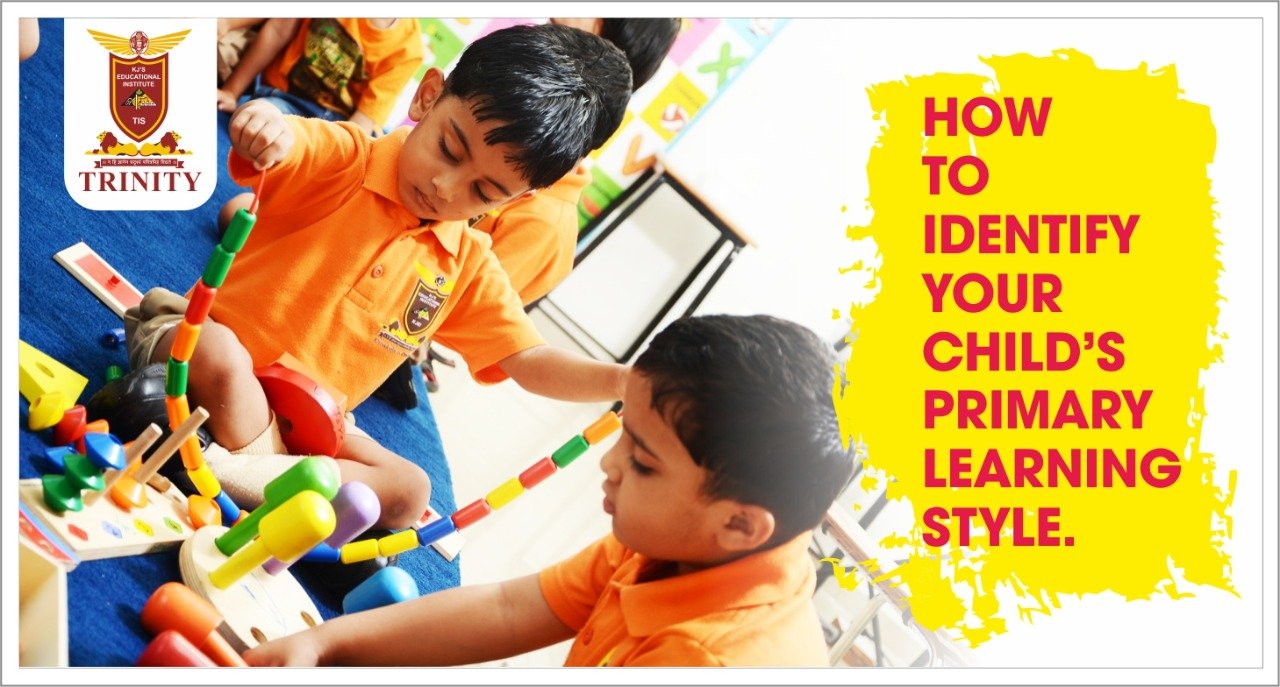
How to Identify Your Child’s Primary Learning Style?
admin@trinityinternationalschool
May 23, 2023

Children have the primal urge to learn and discover the world around them. And they use every medium at their disposal to do so – from touching and smelling, to tasting, hearing, and asking an adult!
As they grow and learn more, they begin to develop a distinct learning pattern. An early appreciation of a child’s preferential learning style can help you to encourage them to learn better.
According to research, there are three prominent learning patterns-
• Kinesthetic Learners: Kinesthetic learners: use physical methods to grasp and acquire a particular piece of information. These kinds of learners have aptitude in sports, dance, and other physical activities. The learners have sharp hand-eye coordination.
• Visual Learners: Visual learners are observers of the world around them and love art. These kinds of lear• Auditory Learnersners are inclined towards reading books and learn using pictures. They have an interest in art and have a vivid imagination.
• Auditory Learners: Auditory learners use audio tools to learn and retain information in the best possible way. These kinds of learners have the aptitude for music, instruments, or vocal ability. They have the ability to listen well and follow verbal directions.
Now that you are aware of the three learning patterns or styles, let’s see how you can determine your child’s primary learning style.
Observe Your Child’s Actions
When a child is more comfortable learning in a certain style, they will also be more expressive through that same style. Watch how your child expresses themselves. For instance, an auditory learner will be able to express itself through words. They can express themselves completely by telling how they feel and what happened in a particular situation.
While a visual learner will be able to express themselves through facial expressions. They can understand people better as they are keen observers. Similarly, a kinesthetic learner will make more use of their hands and gestures. They like to touch everything and experience practically.
Consider Your Child’s Interest
A child’s primary learning style is also normally reflected in their interests. An auditory learner is much interested in music. They get easily distracted by sounds and voices. Visual learners are more inclined towards reading and watching TV, as both these provide visual simulation. A kinesthetic learner can’t sit in one place for a long time. They need to move as that helps them to learn better. They take part in activities like swimming, gym, and other physical activities.
Multiple Learning Style Quizzes
Ask your child to take multiple learning style quizzes. These quizzes will help your child to develop all the three learning patterns and they would not lack any. Quizzes help your child to think critically and examine every situation deeply. On the other hand, these quizzes will help you determine what your child’s learning style is.
Match Your Teaching Style with Child’s Learning Style
Whether you are teaching your child at home or helping them in their homework, make sure that the way you teach matches the child’s learning style. For auditory learners, you can read the chapter out loud or introduce some rhyme and song descriptions. Visual learners can be taught through flashcards, drawings, and educational videos. Kinesthetic learners should be encouraged to make a model of what you are teaching. For example, if you are teaching about the volcano, ask them to actually build a model of it. This kind of teaching will help children to enhance their skills and take active participation in learning.
Do Not Limit To Single Learning Style
Some children may have a combination of learning styles, so don’t expect them to completely identify with a single style. Cater to your child’s learning style. Select an educational program that complements their learning style. Encourage your child to take part in all kinds of activities and do not limit them to what they excel.
Conclusion
We at Trinity International School believe, it’s important to recognize learning patterns early and mold studies according to the pattern for children. As a parent, you must know how to identify the primary learning styles in children but at the same time, you must not limit them to a single learning style. Learning styles are not set in stone and can sometimes shift as a child develops and matures. So do not assume that the child will always have a single interest in learning patterns, they might develop new styles as they grow.
Recent Post



